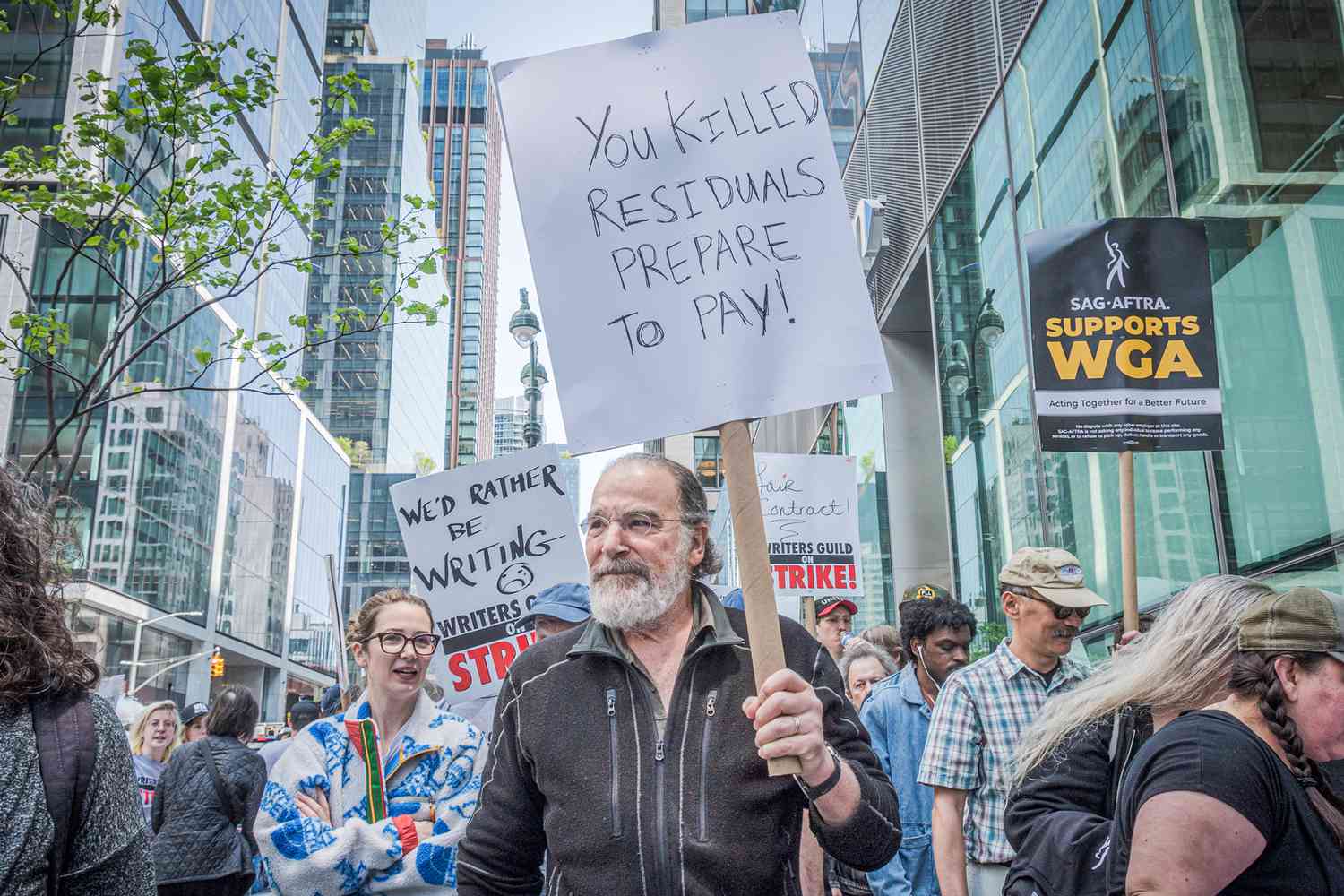WGA And SAG-AFTRA Strike: Complete Shutdown Of Hollywood

Table of Contents
Key Demands of the WGA Strike
The WGA strike, which began in May 2023, centers around several key demands aimed at addressing the changing landscape of the entertainment industry and ensuring fair compensation for writers.
Fair Wages and Residuals in the Streaming Era
The shift from traditional television models to streaming has drastically altered how writers are compensated. While traditional television provided residuals based on syndication and reruns, streaming platforms offer far less predictable and often significantly lower payments. This has led to a significant decline in writers' earnings, particularly for those working on successful shows.
- WGA demands regarding residuals for streaming platforms include:
- A fair share of streaming revenue based on viewership and platform success.
- Transparent accounting practices from studios to ensure accurate payment.
- Longer residual periods for streaming content to reflect its ongoing availability.
The rise of Artificial Intelligence (AI) further complicates the issue. The WGA is pushing for safeguards to prevent the replacement of writers with AI, demanding clear guidelines on the use of AI in writing and script development. They seek to ensure that AI is used as a tool to assist writers, not replace them. Successful negotiations in other industries regarding fair compensation for digital distribution, like music streaming, provide a blueprint for potential solutions in the entertainment industry.
Minimum Staffing Levels and Working Conditions
The WGA also highlights the detrimental effects of insufficient staffing on the quality of television and film productions. The practice of using "mini-rooms," significantly smaller writing teams than previously standard, leads to overworked and underpaid writers, resulting in rushed scripts and compromised creative output.
- The WGA is fighting for:
- Increased minimum staffing levels on all productions.
- Improved working conditions to prevent burnout and promote a healthier creative environment.
- Fairer contracts that protect writers from exploitative practices.
Insufficient staffing not only diminishes the quality of the final product but also contributes to a less collaborative and ultimately less creative writing process. The WGA aims to restore balance and ensure that writers have the time and resources to produce their best work.
Key Demands of the SAG-AFTRA Strike
Joining the WGA on the picket line, SAG-AFTRA's strike highlights similar concerns around fair compensation and the impact of new technologies on actors' livelihoods.
Fair Wages and Residuals for Streaming
Similar to the WGA, SAG-AFTRA members are facing reduced compensation in the streaming era. The shift to streaming has significantly impacted actors' residuals, with many receiving minimal or no payment for their work's continued availability on streaming platforms.
- Key issues include:
- The lack of fair compensation for streaming platforms' use of actors' performances.
- The prevalence of self-tape auditions, which require actors to invest their time and resources without appropriate payment.
- A significant disparity in pay between A-list actors and background actors.
The current system often leaves actors, especially those not at the top of the pay scale, vulnerable to exploitation. The union is pushing for a more equitable model that reflects the revenue generated by streaming services.
Protecting Actors from AI and Data Usage
SAG-AFTRA is deeply concerned about the use of AI and the potential for studios to use actors' likenesses and performances without their consent or proper compensation. The union is pushing for regulations to govern the use of AI in the entertainment industry, protecting actors from potential displacement and exploitation.
- Key concerns include:
- The ethical implications of AI-generated performances and the potential displacement of human actors.
- The lack of transparency surrounding how studios are using actors' data and digital likenesses.
- The need for clear guidelines and contractual agreements regarding the use of AI in performance capture and other areas.
The industry's adoption of AI requires a careful and considered approach that prioritizes the rights and livelihoods of actors. SAG-AFTRA's demands aim to establish a framework that safeguards actors' interests in the age of artificial intelligence.
The Impact of the Double Strike on Hollywood
The simultaneous WGA and SAG-AFTRA strikes have brought the entertainment industry to a near-complete standstill.
Production Shutdowns and Delays
Countless film and television productions have been halted, causing significant financial losses and delaying the release of numerous projects. This includes major studio productions, independent films, and even reality TV shows that rely on writers and actors.
- The ripple effect extends to:
- Post-production houses and visual effects studios.
- Catering companies and other businesses supporting film and television productions.
- The wider economy of cities that heavily rely on entertainment production.
This unprecedented shutdown is already having a significant impact on the release schedules of upcoming films and television shows, leading to uncertainty and potential rescheduling across the industry. Smaller independent productions are often the most vulnerable during times of industry-wide strikes.
Economic Fallout and Political Implications
The economic impact of the double strike is substantial, affecting studios, networks, and countless related businesses. Job losses are a serious concern, extending beyond the writers and actors directly involved in the strike to encompass numerous support staff.
- Political implications include:
- Increased scrutiny of labor practices within the entertainment industry.
- Potential legislative changes regarding fair compensation and worker protections.
- A renewed discussion about the power dynamics between creative professionals and major studios.
The strike has drawn considerable political attention, highlighting the need for stronger worker protections and a fairer distribution of wealth within the entertainment industry. The outcome of these negotiations could significantly influence future labor regulations within the industry and set a precedent for other sectors grappling with similar issues.
Conclusion
The WGA and SAG-AFTRA strikes represent a watershed moment in Hollywood. The core issues of fair compensation, humane working conditions, and the ethical use of AI demand immediate and meaningful attention. The impact of this double strike is far-reaching, affecting not only the creative workforce but also the entire economy supporting the film and television industry. The outcome of these negotiations will undoubtedly shape the future of entertainment production for years to come. Understanding the details of the WGA and SAG-AFTRA strike is crucial for anyone involved in or interested in the entertainment industry. Stay informed and follow developments closely to learn more about the evolving situation and the potential long-term effects of this unprecedented Hollywood shutdown.

Featured Posts
-
 South Sudan Us Agreement On The Return Of Deportees
Apr 22, 2025
South Sudan Us Agreement On The Return Of Deportees
Apr 22, 2025 -
 Joint Nordic Defense Swedens Tank Assets And Finlands Military Personnel
Apr 22, 2025
Joint Nordic Defense Swedens Tank Assets And Finlands Military Personnel
Apr 22, 2025 -
 End Of An Era Ryujinx Emulator Development Stopped By Nintendo
Apr 22, 2025
End Of An Era Ryujinx Emulator Development Stopped By Nintendo
Apr 22, 2025 -
 Ukraine War Fighting Resumes After Putins Easter Ceasefire Ends
Apr 22, 2025
Ukraine War Fighting Resumes After Putins Easter Ceasefire Ends
Apr 22, 2025 -
 Stock Market Pain Investors Push Prices Higher Despite Risks
Apr 22, 2025
Stock Market Pain Investors Push Prices Higher Despite Risks
Apr 22, 2025
